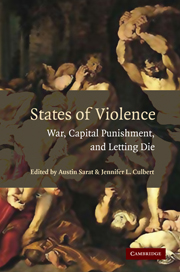Book contents
- Frontmatter
- Contents
- Contributors
- Acknowledgments
- 1 Introduction: Interpreting the Violent State
- PART I ON THE FORMS OF STATE KILLING
- 2 The Innocuousness of State Lethality in an Age of National Security
- 3 Oedipal Sovereignty and the War in Iraq
- 4 Sacrifice and Sovereignty
- 5 Due Process and Lethal Confinement
- 6 From Time to Torture: The Hellish Future of the Criminal Sentence
- 7 The Child in the Broom Closet: States of Killing and Letting Die
- 8 The Lethality of the Canadian State's (Re)cognition of Indigenous Peoples
- PART II INVESTIGATING THE DISCOURSES OF DEATH
- Index
- References
6 - From Time to Torture: The Hellish Future of the Criminal Sentence
Published online by Cambridge University Press: 11 September 2009
- Frontmatter
- Contents
- Contributors
- Acknowledgments
- 1 Introduction: Interpreting the Violent State
- PART I ON THE FORMS OF STATE KILLING
- 2 The Innocuousness of State Lethality in an Age of National Security
- 3 Oedipal Sovereignty and the War in Iraq
- 4 Sacrifice and Sovereignty
- 5 Due Process and Lethal Confinement
- 6 From Time to Torture: The Hellish Future of the Criminal Sentence
- 7 The Child in the Broom Closet: States of Killing and Letting Die
- 8 The Lethality of the Canadian State's (Re)cognition of Indigenous Peoples
- PART II INVESTIGATING THE DISCOURSES OF DEATH
- Index
- References
Summary
If this God of the Christians were proved to us to exist, we should know even less how to believe in him.
– Nietzsche, The Anti-ChristThe word sentence defines both what is written here – “an expressed thought” – and the punishment meted out by a judge to someone who has committed a crime – “a pronounced judgment.” If we focus our attention on the common root of the two meanings of the word derived from its etymology – old French, from the Latin sententia, a way of thinking, opinion, sentiment (prob. for sentientia < sentiens, prp. of sentire, to feel, see sense) – and then trace the connection between the word sense and the word send – the complications multiply. Sense refers both to the five senses through which the brain receives all external stimuli and the faculty of common perception. We all, more or less, have the ability to “make sense” of experience. Any judgment entails the use of the senses and the exercise of sense. Sentencing fundamentally involves sensing, and sensing in turn involves making sense.
I begin by directing attention to these tangled roots, because the judgment that has shaped the development and employment of criminal sentences in the form of imprisonment over time is intimately connected to the shifting meaning of sense and sensibility, as framed by a history of embodiment. That history is, as Michel Foucault demonstrated, coterminous with what can be thought of as the history of bio-politics and its relationship to governmentality.
- Type
- Chapter
- Information
- States of ViolenceWar, Capital Punishment, and Letting Die, pp. 150 - 168Publisher: Cambridge University PressPrint publication year: 2009

